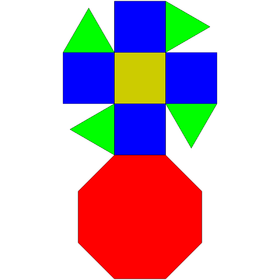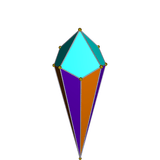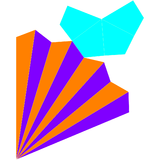Square cupola
| Square cupola | |
|---|---|
 | |
| Type |
Johnson J3 - J4 - J5 |
| Faces |
4 triangles 1+4 squares 1 octagon |
| Edges | 20 |
| Vertices | 12 |
| Vertex configuration |
8(3.4.8) 4(3.43) |
| Symmetry group | C4v, [4], (*44) |
| Rotation group | C4, [4]+, (44) |
| Dual polyhedron | - |
| Properties | convex |
| Net | |
 | |
In geometry, the square cupola, sometimes called lesser dome, is one of the Johnson solids (J4). It can be obtained as a slice of the rhombicuboctahedron. As in all cupolae, the base polygon has twice as many edges and vertices as the top; in this case the base polygon is an octagon.
A Johnson solid is one of 92 strictly convex polyhedra that have regular faces but are not uniform (that is, they are not Platonic solids, Archimedean solids, prisms or antiprisms). They were named by Norman Johnson, who first listed these polyhedra in 1966.[1]
Formulae
The following formulae for volume, surface area, and circumradius can be used if all faces are regular, with edge length a:[2]
Related polyhedra and Honeycombs
Other convex cupolae
| n | 2 | 3 | 4 | 5 | 6 |
|---|---|---|---|---|---|
| Name | {2} || t{2} | {3} || t{3} | {4} || t{4} | {5} || t{5} | {6} || t{6} |
| Cupola |  Digonal cupola |
 Triangular cupola |
 Square cupola |
 Pentagonal cupola |
 Hexagonal cupola (Flat) |
| Related uniform polyhedra |
Triangular prism |
Cubocta- hedron |
Rhombi- cubocta- hedron |
Rhomb- icosidodeca- hedron |
Rhombi- trihexagonal tiling |
Dual polyhedron
The dual of the square cupola has 8 triangular and 4 kite faces:
| Dual square cupola | Net of dual |
|---|---|
 |
 |
Crossed square cupola
The crossed square cupola is one of the nonconvex Johnson solid isomorphs, being topologically identical to the convex square cupola. It can be obtained as a slice of the nonconvex great rhombicuboctahedron or quasirhombicuboctahedron, analogously to how the square cupola may be obtained as a slice of the rhombicuboctahedron. As in all cupolae, the base polygon has twice as many edges and vertices as the top; in this case the base polygon is an octagram.
It may be seen as a cupola with a retrograde square base, so that the squares and triangles connect across the bases in the opposite way to the square cupola, hence intersecting each other.
Honeycombs
The square cupola is a component of several nonuniform space-filling lattices:
- with tetrahedra;
- with cubes and cuboctahedra; and
- with tetrahedra, square pyramids and various combinations of cubes, elongated square pyramids and elongated square bipyramids.[3]
References
- ↑ Johnson, Norman W. (1966), "Convex polyhedra with regular faces", Canadian Journal of Mathematics, 18: 169–200, doi:10.4153/cjm-1966-021-8, MR 0185507, Zbl 0132.14603.
- ↑ Stephen Wolfram, "Square cupola" from Wolfram Alpha. Retrieved July 20, 2010.
- ↑ http://woodenpolyhedra.web.fc2.com/J4.html